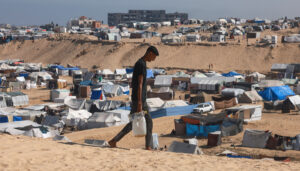 Written by Ramsey G. Tesdell
Written by Ramsey G. Tesdell
This article is the second in a three-part series focusing on education in Jordan. This piece concentrates on higher education.
Higher education in Jordan is suffering from “chronic problems” and faces stiff and unrealistic regulations that are hampering economic development in Jordan according to university and industry officials.
The Kingdom currently has 10 public universities and 17 private institutions that are regulated by the Ministry of Higher Education and Scientific Research. The Ministry also is responsible for the Higher Education Council and the Accreditation Council.
Professor Anmar Kaylani, Dean of the Faculty of Educational Sciences at the University of Jordan said that his department seeks out candidates that have studied outside of Jordan.
“The current system doesn’t prepare the students academically for stringent college studying which affects their ability to enter the work force. We prefer to hire those with degrees from the USA, rather than local degrees,” Kaylani said.
Hisham Ghasib, the president of Princess Sumya University of Science and Technology (PSUST) in Amman, said chronic problems are crippling the progress of not just students, but of the country as whole.
“The ways and methods of many of the universities in Jordan are imposed in a military fashion and leave a lot to be desired. The methods focus too much on formalistic training only consider the numbers of students without taking into account the quality of the teachers,” Ghassib said.
The regulation of colleges and universities has come under scrutiny for being unrealistic and rules governing the system are said to be outdated.
“The rules and low quality of education are major problems. Out of the top 500 universities in the world, none of them are Jordanian,” said Yusuf Mansur, an economist and consultant based in Amman.
According to Ghassib, the kafaa exam is a way to subject government universities to a standard. The ministry wanted a way to measure Jordanian universities and compare them to universities around the world.
Kafaa, a competency exam designed primarily to evaluate students at both public and private universities in the Kingdom is obligatory for Jordanian university students in the targeted fields but optional for non-Jordanians.
“The Ministry of Education felt the need to measure the level of graduates to compare to the world graduate standard. Testing started with computer science. In the computer science subject, Princess Sumya attained a higher average than the world average score,” Ghassib said of the kafaa exam.
The exam consists primarily of 120-150 objective questions test’s the student’s accumulated knowledge in the field of study. ETS operates the test and is an influential player in educational assessment. They also run the Test of English as a Foreign Language (TOEFL), which is taken worldwide to test English proficiency.
Ghassib said that regulation is necessary, but needs to be reflective of current resources. “We need different criteria of accreditation to raise the standard of education. Private universities have too much freedom, private universities have too little freedom.”
“Regulation needs to take into consideration our resources. Encourage progress but also be realistic in our expectations,” Ghassib said.
Ghassib cites a model where students at PSUST are taught real-world skills in a program that expects them to receive actual training while still taking classes. He argued the program has been very effective.
“Our (PSUST) graduates are very successful in the market place. One reason is because we require our students to do a two-month training internship, and a graduation project that gives them real world experience.”
Duried Jerab, the general manager for the medical division of Karael International Trading Establishment earned his bachelor degree in business administration from the University of Kent and an MA in management from the University of Durham in the United Kingdom.
“Many students who study in Jordan live with their families at home, and in my opinion you don’t get the proper student experience. When you study abroad, or even live on your own, you become independent,” Jerab told 7iber.com. “Graduates from universities here are not as qualified to go into the real world.”
Ghassib said of many students entering universities there is presently an attitude against knowledge and students’ conduct is disruptive to an academic atmosphere. An ethical and attitude problem of students – such as plagiarism and fighting on campus – is hampering education.
Educational experts argue however that is a general misconception about the education in Jordan. The Kingdom is rated as the most literate country in the Arab World, 41st worldwide with a total of 91.3% of those over age 15 who can read and write. He argued that Jordan’s education, when compared to other Arab countries is creating an avenue for graduates to leave Jordan. He also noted that it isn’t the high level that it used to be.










